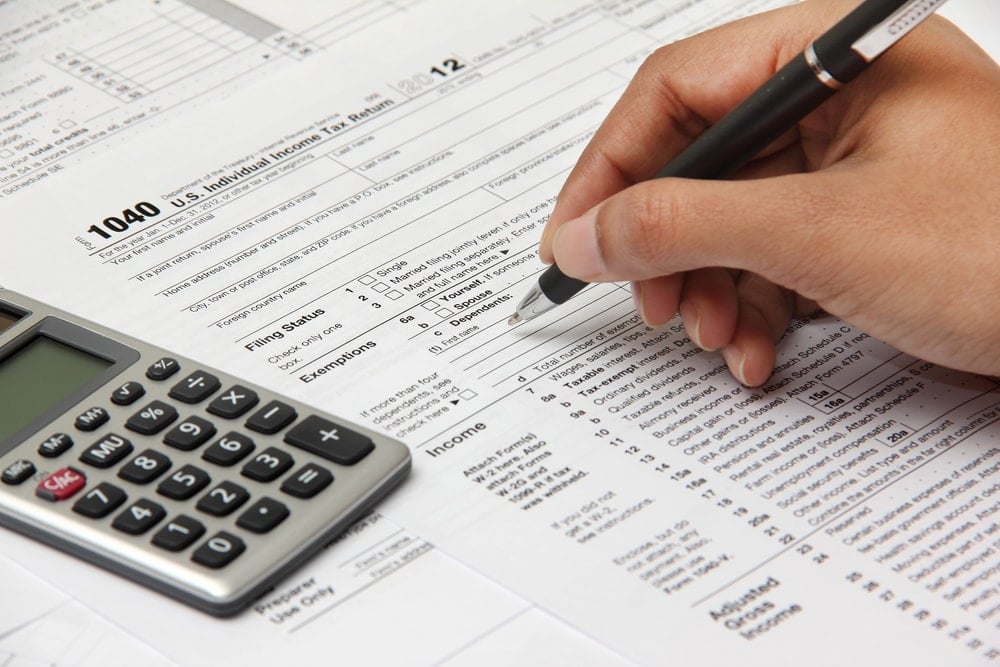Being a property manager or owner has many perks that people often overlook, such as vacation rental tax benefits and deductions. While there are many expenses and rules to consider when running a vacation rental business, you can rest assured knowing that there are ways to lower your taxable income.
Even if you’ve had a good year financially, no one wants to hand over their hard-earned cash to the government treasury. While there’s nothing you can do to avoid paying Uncle Sam, carefully itemized vacation rental tax deductions can help you keep as much of that cash in your pocket as possible.
Don’t see the form to download the Expense Spreadsheet? Click here.
Each country has its own tax regulations that govern rental properties. Short-term rental tax deductions will always vary depending on location, so be sure to investigate your country and state tax code long before you declare your annual rental income.
Ready to find out what taxes are deductible if you’re a vacation rental owner in the United States? Let’s dive into vacation rental tax rules.
Vacation rental tax rules: basic requirements
Before you start tallying federal deductions in the U.S., make sure you meet the Internal Revenue Service’s basic requirements for rental properties, aka the 14-day rule.
What is the 14-day rule for vacation rentals? Here’s the gist:
- You must rent your property for more than 14 days out of the year. This is a measure of the 14-day rule for vacation rentals that will make or break whether you can categorize your vacation rental as a business. Any less, and the IRS considers your rental a second home and some tax deductions won’t apply.
- You need to keep track of any time you spend using your vacation rental for personal use. Exceed 14 days or 10% of the total time your property is used, and you’ll only be able to deduct a portion of some property expenses. The IRS looks at vacation homes as either a business or investment depending on the ratio of personal days to rented days. Keep in mind that personal use puts your property into the “investment” zone, making certain deductions void.
Personal use is defined as when a vacation rental property is used by:
- You or any other person who has an interest in the property
- A member of your family (or of the person who has an interest in it), unless they use the property as their main residence and pay the fair rental price
- Anyone that lets you use another residence under an agreement
- Anyone paying less than the fair rental price
If you seldom stay at your rental property, you’ll be able to deduct the full amount in most cases. Eligible vacation rental properties receive better and normally more substantial deductions than those categorized as investments. We recommend always consulting a professional tax adviser to be thoroughly informed.
What expenses can I deduct from my vacation rental business?
If this is your first time filing taxes for your vacation rental, you might be feeling a little overwhelmed. Staring at the different tax codes, breaks, exceptions, and all the legalese that it entails can be intimidating, to say the least. Thankfully, you don’t have to be a tax expert to file, but you should read up on what expenses are eligible to get as much money back as possible.
Here are the top 10 vacation rental expenses you should consider deducting when it comes to filling out your tax return. We created a video back in 2019 to help highlight these expenses, but we’ve added a few more to the mix since then!
1. Repairs, maintenance, and cleaning
Even the luckiest property owners should expect to have some repair and maintenance costs. So whether you need a new roof or have to fix a leaky sink, you should plan on deducting any professional service fees and the cost of supplies. Bear in mind that rental property cleaning services are also considered a deductible expense.

2. Transportation expenses for maintenance and management
You might even be able to deduct local transportation expenses spent on collecting rental income, maintenance, or managing your vacation rental property. However, you can only deduct these expenses if your rental is your principal place of business. For more information, check out Publication 587, Business Use of Your Home.
3. Insurance
Gorgeous beach houses and scenic mountain retreats are hot rental properties, but the cost to insure them against hurricanes, mudslides, and other natural disasters can be hefty. Add in some liability insurance to protect your assets in case of an accident, and well, it’s really no wonder your insurance agent sends you a card during the holidays!
It’s up to you whether you want to keep the card, but be sure to save the vacation rental insurance bill as proof of a valid vacation rental tax deduction.
4. Utilities and taxes
The cost of providing electricity, internet, water, and other essential utilities for your rental can easily amount to several hundred dollars each month. Add state and local taxes into the mix, and these potential vacation rental deductions can be worth thousands of dollars each year.

5. Marketing and advertising
However you decide to advertise your rental property, the money you spend on marketing is entirely tax-deductible. You can even deduct your Lodgify account fees as a cost of doing business! Consider paying one or two years’ worth of Lodgify fees upfront, and you’ll not only snag a 20-25% discount but also a nifty tax deduction. But more on that later.
6. Accounting fees
You may have completed your tax forms with just a pencil and a calculator in the past, but a good accountant can save you more than just time. Taxes are anything but straightforward, so it’s easy for some vacation rental deductions to fall through the cracks.
Save yourself a job and get your accountant to do it. After all, any tax professional will know that the accounting bill you pay is also a valid tax deduction.
7. Towels, sheets, and supplies
It might seem strange, but you can even deduct the amount spent on towels, sheets, and other furnishings or amenities that are a requirement of a rental property business. So, be sure to keep all those Bed Bath & Beyond receipts to cash in on later!

8. Depreciation
One of the most common expenses to deduct is for depreciation of the property, typically considered a “paper loss” for most businesses. In real estate, specifically, it’s a loss that’s not necessarily tangible or in the form of cash. It’s a capital expense that you can begin to deduct as soon as your vacation rental is prepped and fit for leasing out to guests.
Read more in Chapter 2 of the IRS Residential Property (including vacation homes) guide.
9. Vacant rental property
For regular rental property, owners can often deduct costs and expenses for its management and conservation while unoccupied. For vacation rental owners, it could be worth investigating if this expense is deductible for you, too. Especially if your rental has suffered something that has negatively affected booking numbers (such as natural disasters or house fires).
10. Legal fees
You can deduct legal and professional expenses (like tax return preparation fees) and any expense you paid to resolve a tax underpayment regarding your vacation rental. However, this does not include federal taxes and penalties.
Once you recognize some of your biggest possible deductions, it’s easy to understand why keeping a record of all of your expenses can help you save big. Your record-keeping system doesn’t have to be fancy, but it does have to be accurate and thorough. There are even free tools available to help with this!
Most overlooked tax deductions for vacation rentals
There’s an exorbitant amount of moving pieces when it comes to running a vacation rental. Between the expenses that you accrue from owning the house to hosting the guests and everything in between, some vacation rental tax deductions get overlooked. Deductions help you to earn back some of that hard-earned money from your property, so what are the “hidden gems” of tax codes?
Service fees
Believe it or not, guest fees can be vacation rental tax write-offs and often help to cushion the blow of other costs that aren’t eligible. Airbnb services fees are actually tax-deductible for hosts. Some vacation rental owners make the mistake of ignoring this expense, as it seems like a cost that could only be deductible on Airbnb’s end. But in reality, hosts can also enjoy the benefits of this deduction.

Other online travel agencies like Vrbo and Booking.com include guest fees (sometimes referred to as guest service fees) that are equally deductible. When you receive your IRS 1099 form from the companies you list with, you’ll see the house rental earnings with the fees included. You’ll then deduct these fees from your reported rental income.
Workcation
Obviously, the IRS isn’t going to pay for your personal holidays outright. If you want to deduct your stay at the rental property, you’ll have to make it a “workcation,” in a sense.
For example, if you fly from your primary residence to your vacation rental and make some repairs on the property during your stay, you can count the transportation as a related expense. If you’re planning to be there for a week, you’ll need to work five days, as if it were a regular week in the office. The trip must be for necessary reasons, so you’ll need full documentation to prove it wasn’t a pure leisure trip.
You’ll need to plan these expenses in advance rather than just taking an impulsive trip. Additionally, the IRS expects a thorough itinerary and a list of expenses, including timestamps. The IRS penalties can be extreme, so be sure to be truthful about what’s a vacation for vacation’s sake and when you really are reforming or repairing your home.
Software
In theory, you can deduct every single software solution or product you use for your business from your vacation rental taxes. Do you have Adobe Photoshop to edit and brighten your vacation rental photos? Or perhaps you use a social media scheduling service to market your vacation rental. Deduct it from your taxes!
If you can prove that the software or subscription purchased is both work-related and a necessary expense, then you can count it as a write-off. The IRS ultimately determines what’s essential or not when it comes to software and other vacation rental tax write-offs, so consider what your employees or business can’t live without, like a good channel manager or property management software!
The QBI deduction
If your rental real estate is considered a business or entity, you might be eligible for the Qualified Business Income (QBI) deduction. This is a special type of deduction reserved just for eligible self-employed and small business owners that allows for up to 20% of your total earned income back.
According to NerdWallet, to be eligible, your taxable income must be under:
- $182,100 for single filers in 2023 ($191,950 in 2024)
- $364,200 for joint filers in 2023 ($383,900 in 2024)
If you exceed these income limits, you may still be able to claim the deduction, but it depends on the nature of your business. This is where things get complicated, so we recommend working with a tax professional to determine your eligibility.
How to deduct your vacation rental taxes
If your vacation rental property is in the U.S. or if you reside in the U.S., you probably already know how complex the tax laws can be. The IRS will give you back your eligible earned amount, but only after you crunch the numbers. In most cases, you’ll write off your taxes using either the Schedule C or Schedule E form.
The Schedule E form can best be described as the side hobby owner. You don’t make the majority of your income from this endeavor and you don’t invest as much time into the property.
The Schedule C form, on the other hand, is for full-time vacation homeowners who run their business as their primary source of income. They also put in “substantial” work for their vacation rental business.

Most opt for the C or E filing type as it makes the most sense for vacation rental owners in terms of taxation. However, sometimes owners are wrongfully misled to believe that an S corporation is the right way to file.
Experts strongly advise not to file as an S corporation for a number of reasons. Tax-free exchanges are extremely complicated, meaning if you want to change ownership from one generation to the next, it might be nearly impossible. As such, the death of the vacation rental owner makes deductions and filing more difficult than other types of corporations, such as C or E filing. Lastly, if you’re still paying off a loan for your vacation rental business, you lose the tax shield you’d otherwise have in other types of filings.
Once you’ve figured out the right tax form for your business, you’ll need to categorize your expenses. Depending on how you file, either as an investment property or a business, you will either list your expenses under “work-related expenses” or “itemized deductions,” which breaks down into an even more expansive list of vacation rental tax write-offs.
How to deduct Lodgify software expenses from your taxes
Even the government recognizes the necessity of vacation rental software for your business! So, your Lodgify software is, fortunately, an easily deductible expense.
All you have to do to get money back for your vacation rental software is list it as an itemized expense. Under the category “Miscellaneous Expenses,” you’ll detail the cost of the subscription. If you’ve purchased any Lodgify add-ons, you can deduct them here, too.
When to deduct your vacation rental expenses
Most people know that tax season begins in late January and ends in mid-April, but few people know there are two “times” for filing. One option is to file during tax season and the other is to file as you go.
The first (and most commonly used) is the accrual method, which is when you report your expenses in the same year that you pay them regardless of when the expense occurred. Most vacation rental owners prefer this method, as it gives them time to put their expenses and deductions in order.
If you’re a cash-basis taxpayer, you report income when you earn it, instead of all at once at the end of the tax season. These deductions are made at the time of the incurred expense rather than waiting. If you have a consistent, well-scheduled vacation rental with fewer reservations, you might prefer this method due to its immediateness.
It might seem tedious, but the time spent calculating and adding up your deductions could get you around 20% back in taxes. That’s huge for small business owners!
But remember—the IRS is meticulous and they expect full proof and detailed receipts. You’ll need to closely follow their vacation rental tax rules if you want to see any of that money back.
Fortunately, you can set up electronic billing for most expenses or send them to your email. You can then track and save all your receipts and expenses in the Lodgify accounting tool so you don’t have to worry about a tax meltdown come April.
Haven’t tried Lodgify yet? Set your vacation rental up for success with property management software that streamlines your business and is tax deductible. Try Lodgify for free today!
Don’t see the form to download the Expense Spreadsheet? Click here.


